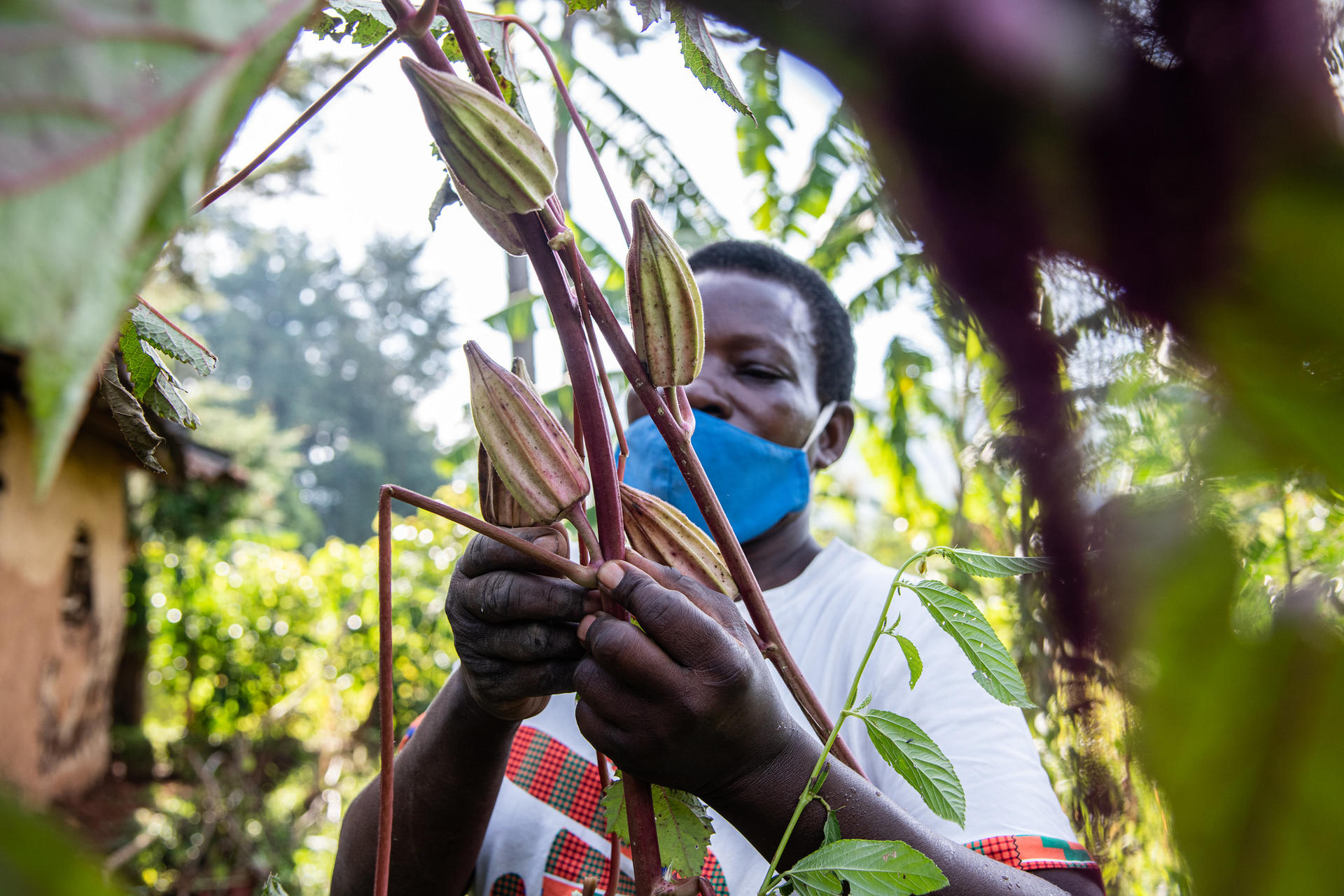2020 Annual Report Beyond crop breeding: towards nutritious and diverse food for Africa

In Africa, we are linking agronomy rigorously with health and deeper societal concerns, especially those exacerbated by the COVID-19 pandemic.

Suzanne Ngo-Eyok
Managing Director, AfricaIn Africa, our research has historically focused on crop improvement. Our success is rooted in rigorous research for healthier soils, improved forages for livestock, higher-yielding beans and bananas. These are key food-security crops in Africa. Our research boosts availability of these crops and ensures they can successfully beat diseases, pests and climate extremes like drought or flooding.
By 2030, higher temperatures and droughts may cut common bean production by 3-5% across Africa, with serious implications for food and nutrition security in countries where beans are a staple food. To support farmers and partners in the region in adapting to climate change – or even to thrive despite it – our research has led to the development of high-yielding climbing bean varieties, enabling farmers to switch to vertical varieties of bean in the Great African Lakes region.
Working with partners to focus on people
These varieties grow upwards, allowing farmers to produce more in less space. Critically, this research underscores a shift. In collaboration with our partners, including farmers, this research goes beyond crop improvement to examine traits and varieties that consumers demand. It reflects a wider shift in our work, from what crops we improve, to why we improve them and for whom. Our efforts have shifted from pure breeding, to the farmers who adopt the crops, asking what traits they are looking for, including better nutritional qualities.
Our core mandate is still agronomic advancement, but we are linking agronomy more rigorously with health and deeper societal concerns. For example, in Rwanda, our research shows that a diet of high-iron beans improves health of anemic women. The study introduced an 18-week diet of high-iron beans and found improved physical performance in women, highlighting the potential of biofortified crops to address nutritional deficiencies in low-income countries. Our researchers also take key consumer demands into account: for example, making sure new bean varieties cook faster.
We have shifted the management of relationships, from contributing to the development of National Agricultural Research Systems, to supporting them. In Ethiopia, our work alongside national researchers has unlocked the secrets of the country’s unique ancestral grain teff. The native staple food grain is under threat, with 80% of production to be hit by higher temperatures soon if not protected.
For the first time, our scientists have mapped thousands of the crop's varieties to fast-track efforts to save it, deepening our understanding of how the crop can help us adapt to nutrition or climate challenges. We are also contributing to the preservation of rich diversity on the continent. In Uganda, we work with rural farmers to help protect the country's indigenous seeds through a community-based initiative that is empowering women to better nourish their families and improve household income.
Research Highlight
A no-meat diet everywhere will not solve the climate crisis
Livestock play a valuable role in low- and middle-income countries, especially in Africa, where nutrition and livelihoods are often closely tied to livestock production and consumption. Read the publication and our press release.
More Research Highlights
A diet of high-iron beans improves health of anemic women in Rwanda
An 18-week diet of high-iron beans improved the physical performance of women at a university in Rwanda. The study shows the potential of biofortified crops to address nutritional deficiencies in low-income countries. Read our press release.
Cool beans: A vertical crop fit for Africa's changing climate and nutritional gaps
By 2030, higher temperatures and droughts may cut common bean production by 3-5% in Africa; farmers can adapt by switching to climbing varieties of this key crop in the Great African Lakes region, parts of Ethiopia, Cameroon, Zimbabwe and Rwanda. Read the study and our press release.
Examine narratives to end policy deadlock and boost agricultural development in Africa
Should the state or the market lead? This question arises often in policy discussions for the development of agriculture in Africa. This research paper examines the problem of one-sided narratives and proposes a path beyond the dichotomy. Read our news article.
A multi-center, multi-partner strategy for COVID-19 in Ethiopia
Scientists from CGIAR, including the International Livestock Research Institute and Alliance of Bioversity International and CIAT, worked with national partners to develop solutions that highlight how agriculture expertise can be adapted to support efforts to mitigate the pandemic in Ethiopia.
COVID-19 makes a strong case for increased urban farming
Originally published in Africa’s Business Daily newspaper, this piece by the Alliance’s Job Kihara and Rosemary Nzuki lays out the benefits of urban farming, which if scaled up, could provide food and nutritional security to millions in Africa well after the pandemic subsides.
Alliance’s Chege makes the airwaves on World Food Day
In this excellent interview on Nairobi’s KTN News, the Alliance’s Christine Chege discusses the importance of World Food Day and efforts to end hunger and increasing nourishment in Africa.
Multimedia highlights
DW News covers Alliance seed & banana work in Uganda
Germany’s DW News produced an excellent TV news segment on how farmers in Uganda are working with the Alliance to fight pests, climate change and conserve agricultural biodiversity.
